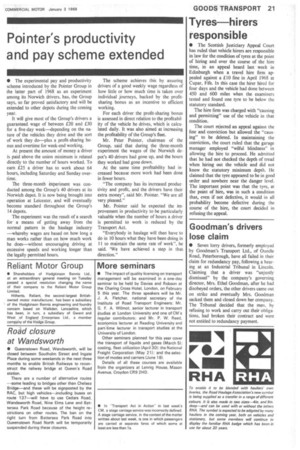Pointer's productivity and pay scheme extended
Page 23

If you've noticed an error in this article please click here to report it so we can fix it.
• The experimental pay and productivity scheme introduced by the Pointer Group in the latter part of 1968 as an experiment among its Norwich drivers, has, the Group says, so far proved satisfactory and will be extended to other depots during the coming year.
It will give most of the Group's drivers a guaranteed wage of between £20 and £30 for a five-day week—depending on the nature of the vehicles they drive and the sort of work they do—plus a profit-sharing bonus and overtime for week-end working.
At present the amount of money a driver is paid above the union minimum is related directly to the number of hours worked. To earn £25 a driver has to work about 64 hours, including Saturday and Sunday overtime.
The three-month experiment was conducted among the Group's 40 drivers at its • Norwich depot. It is now being brought into operation at Leicester, and will eventually become standard throughout the Group's 14 depots.
The experiment was the result of a search for a means of getting away from the normal pattern in the haulage industry whereby wages are based on how long a man works rather than on how much work he does—without encouraging driving at excessive speeds and working longer than the legally permitted hours. The scheme achieves this by assuring drivers of a good weekly wage regardless of how little or how much time is taken over individual journeys, backed by the profitsharing bonus as an incentive to efficient working.
For each driver the profit-sharing bonus is assessed in direct relation to the profitability of the vehicle he drives, which is calculated daily. It was also aimed at increasing the profitability of the Group's fleet.
Mr. Peter Pointer, chairman of the Group, said that during the three-month experiment the wages of the Norwich depot's 40 drivers had gone up, and the hours they worked had gone down.
At the same time profitability had increased because more work had been done in fewer hours.
"The company has its increased productivity and profit, and the drivers have their extra money", said Mr. Pointer. "We are all very pleased."
Mr. Pointer said he expected the improvement in productivity to be particularly valuable when the number of hours a driver is permitted to work is reduced by the Transport Act.
"Everybody in haulage will then have to do in 10 hours what they have been doing in 11 to maintain the same rate of work", he said. 'We have achieved a step in thatdirection."




























































































